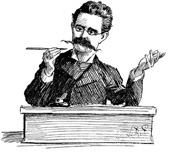
In Defense of Adrienne von Speyr
REPLY TO ANNE BARBEAU GARDINER
The provocative title of Anne Barbeau Gardiner’s article, “The Dubious Adrienne von Speyr: Correcting the Deposit of Faith?” makes her intention clear: to show that the “private revelations” of this mystic are in conflict with Catholic teaching on essential points: the eucharistic Transubstantiation of the bread and wine into the Body and Blood of Christ; Hell as an eternal reality destined for the souls of those who die in the state of mortal sin; the visible reality of the Church as an integral element of her holiness.
To accomplish this, the author makes use of two kinds of symmetrical arguments. Taking as her only basis a brief meditation entitled The Passion from Within (Ignatius Press, 1998), she carefully chooses a certain number of extracts that, on the one hand, she skillfully sets in contrast with the official documents of the Catholic Church, and, on the other hand, she compares with various texts of the Protestant heritage: Luther’s “Articles of Smalkald” (1537), Daniel Brevint’s Missale Romanum (1672), or Calvin’s Institutes (1536). (She also suggests that a parallel could be developed with other leading Calvinists such as Hugh Latimer or Zwingli.) From this she believes she can conclude that despite her conversion to the Catholic faith, Adrienne von Speyr has retained a certain number of ideas which were present in the early Protestant attacks against the Catholic Church of the 16th or 17th century, and that her language is at the very least “ambiguous.”
In introducing the article, the Editor enumerates the qualifications of the author: Professor Emerita of English; she recently published with Catholic University of America Press a work on John Dryden’s The Hind and the Panther (1687), a book which the English poet, known for his artful satire in religious matters, wrote shortly after his conversion to Catholicism to support his co-religionists. Gardiner does not present herself as a theologian. For her judgment in doctrinal matters she relies on two or three references to the Catechism of the Catholic Church and the Profession of Faith of Paul VI (Mysterium Fidei) — especially on the question of Transubstantiation — to which she adds some references to works supposed to explain what “the Catholic Church has always taught”: The Catholic Encyclopedia (1910), Attwater’s Catholic Dictionary (1958), but also Dante’s Inferno. Nor does she claim to have any extensive knowledge of the mystic she criticizes: Besides the work in question, she limits herself to citing First Glance at Adrienne von Speyr (Ignatius Press, 1986), a book which the eminent Catholic theologian Hans Urs von Balthasar, named cardinal shortly before his death, published in 1968.
Is she aware that on the occasion of his receiving the Paul VI award in 1984, Pope John Paul II himself invited Balthasar to organize at Rome a symposium on the thought of Adrienne von Speyr, the proceedings of which were published under the title Adrienne von Speyr and Her Ecclesial Mission (Johannes Verlag, 1986)? Or that in 1998 the Dizionario di Mistica, published by the Libreria Editrice Vaticana, devoted to her an article by P. Sequeri, Professor of Fundamental Theology at the Catholic University of Milan, in which her thought is judged apt to “open more fully the objective depths of the Christian mystery”? It is possible, and even probable, that she is also unaware of other positive contributions of this nature. But that no doubt is of little interest to her, since it is as a philologist that she does her work and her reflection, as is attested by the recurrence in her article of the word “language” (the “orthodox” language of Catholic theology; the “heretical” language of our Protestant brothers).
You May Also Enjoy
According to Kant, we do not look upon the world as it is, but upon an appearance of the world projected by the structures of the human mind.
Von Balthasar was influential in Adrienne von Speyr’s conversion; he was her confessor, secretary and editor of her “dictations”; and her “dictations” profoundly influenced his theology.
Gregory Wolfe says he came to discover that modernity is more "complex" than he had thought.

